
Corn syrup is a food syrup which is made from the starch of corn/maize and contains varying amounts of sugars: glucose, maltose and higher oligosaccharides, depending on the grade. Corn syrup is used in foods to soften texture, add volume, prevent crystallization of sugar, and enhance flavor. It can be processed into high-fructose corn syrup (HFCS) by using the enzyme D-xylose isomerase to convert a large proportion of its glucose into sweeter fructose.

Breakfast cereal is a breakfast food made from processed cereal grains. It is traditionally eaten as part of breakfast, or a snack food, primarily in Western societies.

General Mills, Inc., is an American multinational manufacturer and marketer of branded processed consumer foods sold through retail stores. Founded on the banks of the Mississippi River at Saint Anthony Falls in Minneapolis, the company originally gained fame for being a large flour miller. Today, the company markets many well-known North American brands, including Gold Medal flour, Annie's Homegrown, Lärabar, Cascadian Farm, Betty Crocker, Yoplait, Nature Valley, Totino's, Pillsbury, Old El Paso, Häagen-Dazs, as well as breakfast cereals under the General Mills name, including Cheerios, Wheaties, Chex, Lucky Charms, Trix, Cocoa Puffs and Count Chocula and the other monster cereals.
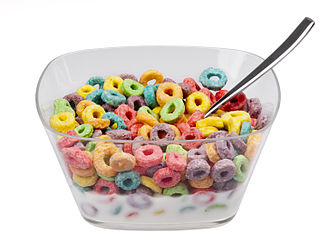
Froot Loops is a sweetened, fruit-flavored breakfast cereal made by WK Kellogg Co for the United States, Canadian, and Caribbean markets and Kellanova for the rest of the world. The brand was solely owned by the original Kellogg Company before it spun off its North American cereal division as WK Kellogg Co in late 2023. The fruit-flavored cereal pieces are ring-shaped, with a variety of bright colors.

Squash, is a non-alcoholic beverage with syrup used in beverage making. It is usually fruit-flavoured, made from fruit juice, water, and sugar or a sugar substitute. Modern squashes may also contain food colouring and additional flavouring. Some traditional squashes contain herbal extracts, most notably elderflower and ginger.
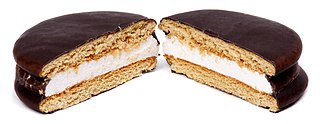
A Moon Pie is an American snack, popular across much of the United States, which consists of two round Graham crackers, with marshmallow filling in the center, dipped in a flavored coating. The snack is often associated with the cuisine of the American South, where they are traditionally accompanied by an RC Cola. Today, MoonPies are made by Chattanooga Bakery, Inc., in Chattanooga, Tennessee.

Pibb Xtra, formerly called Mr. Pibb, is a soft drink created and marketed by The Coca-Cola Company. It is a kind of pepper soda with several variants.

Cheez Whiz is a brand of processed cheese sauce or spread produced by Kraft Foods. It was developed by a team led by food scientist Edwin Traisman (1915–2007). It was first sold in 1952, and with some changes in formulation continues to be in production today.

Cheerios is a brand of cereal manufactured by General Mills in the United States and Canada, consisting of pulverized oats in the shape of a solid torus. In some countries, including the United Kingdom, Cheerios is marketed by Cereal Partners under the Nestlé brand; in Australia and New Zealand, Cheerios is sold as an Uncle Tobys product. It was first manufactured in 1941 as CheeriOats.
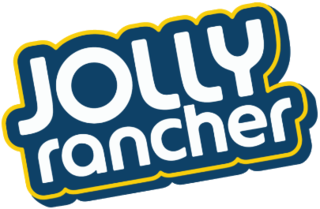
Jolly Rancher is an American brand of sweet hard candy, gummies, jelly beans, lollipops, sour bites, and a line of soda put out by Elizabeth Beverage Company in 2004. Originally created in Colorado in the 1950s, the Jolly Rancher brand has been owned by The Hershey Company since 1996.
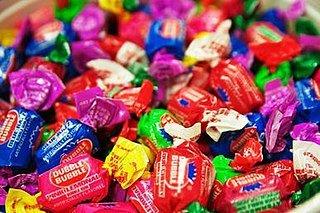
Dubble Bubble is an American brand of fruit-flavored, usually pink-colored, bubble gum invented by Walter Diemer, an accountant at Philadelphia-based Fleer Chewing Gum Company in 1928. One of Diemer's hobbies was concocting recipes for chewing gum based on the original Fleer ingredients. Though founder Frank H. Fleer had come up with his own bubble gum recipe under the name Blibber-Blubber in 1906, it was shelved due to its being too sticky and breaking apart too easily. It would be another 20 years until Diemer would use the original idea as inspiration for his invention.

Hot Tamales is an American brand of cinnamon-flavored candies introduced in 1950 manufactured and marketed by the Just Born company. They were developed by Bob Born, son of Sam Born, the company's founder. The name derives from the sometimes spicy flavor of tamales. It was the top-selling cinnamon candy in 1999.

Honey Bunches of Oats is a breakfast cereal owned by Post Holdings and produced by its subsidiary Post Consumer Brands. Created by lifelong Post employee Vernon J. Herzing by mixing several of Post's cereals together and having his daughter taste them, Honey Bunches of Oats was introduced to markets in 1989 after three years of development. The cereal is made up of three kinds of flakes and oat clusters baked with a hint of honey. It is marketed as a source of whole grain. Other varieties have almonds or fruits added into the mix.
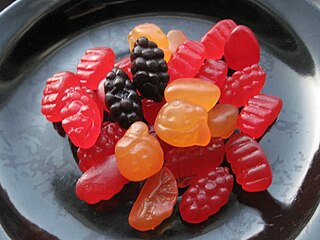
A fruit snack is a type of gummy snack made with fruit flavoring and natural gelatin. They were first made by confectioner Louis Shalhoub in the 1970s as a lightweight high energy snack food for backpackers. Although they are often marketed as a healthier alternative to regular gummy candies, the veracity of these claims is disputed, as fruit snacks typically contain fruit flavoring instead of actual fruit and contain added sugar more comparable to a typical candy.
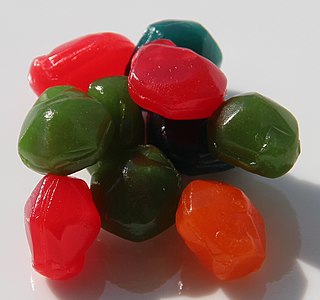
Fruit Gushers are a Betty Crocker-branded fruit snack introduced in 1991. They are soft and chewy with a fruity-juice center.

PayDay is a brand of a candy bar first introduced in 1932 by the Hollywood Candy Company. The original PayDay candy bar consists of salted peanuts rolled over a nougat-like sweet caramel center. Since 1996, classic PayDay candy bars without chocolate have been continually produced by The Hershey Company. In 2020, Hershey's released a "Chocolatey PayDay bar" as a permanent part of the PayDay product line; it is identical to the regular bar, but covered by a layer of chocolate.

Fruit by the Foot is a fruit snack made by General Mills and distributed under the Betty Crocker brand. It was introduced in 1991 in North America. It is still in production.

Hershey's Cookies 'n' Creme is a candy bar manufactured by The Hershey Company and first introduced in 1994.

Tootsie Roll is a chocolate-flavored candy that has been manufactured in the United States since 1907. The candy has qualities similar to both caramels and taffy without being exactly either confection. The manufacturer, Tootsie Roll Industries, is based in Chicago, Illinois. It was the first penny candy to be individually wrapped in America.




















